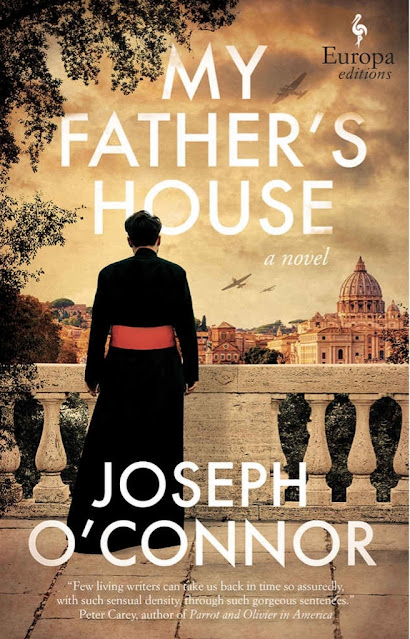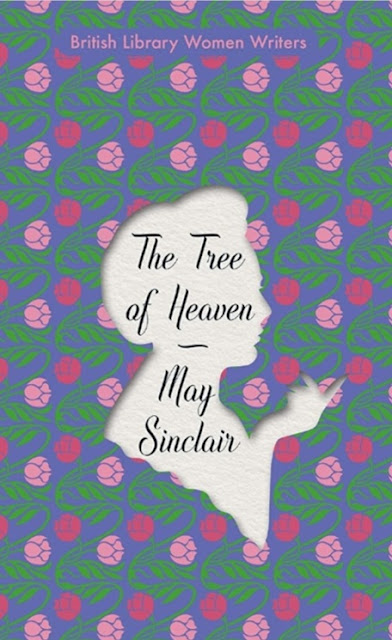Having recently read Lysistrata I imagined Aristophenes after reading The Queen of Gay Street thinking the next time he stages the comedy he will have the sex starved women of Athens work each other over with strap ons. Maybe Alexander Portnoy would wish he could have a three way with the author and The Monkey.
Sunday, November 27, 2022
The Queen of Gay Street by Esther Mollic -A Memoir -2022 - 189 pages
Having recently read Lysistrata I imagined Aristophenes after reading The Queen of Gay Street thinking the next time he stages the comedy he will have the sex starved women of Athens work each other over with strap ons. Maybe Alexander Portnoy would wish he could have a three way with the author and The Monkey.
Saturday, November 26, 2022
My Father's House by Joseph O'Connor - A Novel - forthcoming January 31, 2023 - A Novel - forthcoming January 31, 2023 - 440 pages
My Father's House by Joseph O'Connor - A Novel - forthcoming January 2023- 440 Pages
Wednesday, November 23, 2022
The Tree of Heaven by May Sinclair - 1917 - British Library Women Writers Edition-2020 with a Preface by Tanya Kirk and an Afterword by Simon Thomas
Thursday, November 17, 2022
Women of the Assembly by Aristophenes- 392 BCE -Translated by Aaron Poochigian-2021
Wednesday, November 16, 2022
1493 Uncovering The New World Columbus Created by Charles C. Mann - 2011 -506 pages
1493: Uncovering the New World Columbus Created by Charles C. Mann - 2011- 560 pages
I was completely fascinated by this incredibly informative work about the impact the arrival of Columbus on the island of Hispanola, near the current location of Santo Domingo,in 1492, had on Asia, Europe, as well as North and South America. The transformations impacted the lives of everyone. 1493 by Charles C. Mann book takes as its starting point the 1972 ground breaking
work by the historian Alfred W. Crosby in The Columbine Exchange.
In order to try to convey what Mann is doing in 1493 I think it is worth quoting at some length from his preface.
"Before Crosby looked into the matter, historians tended to explain Europe’s spread across the globe almost entirely in terms of European superiority, social or scientific. Crosby proposed another explanation in Ecological Imperialism. Europe frequently had better-trained troops and more-advanced weaponry than its adversaries, he agreed, but in the long run its critical advantage was biological, not technological. The ships that sailed across the Atlantic carried not only human beings, but plants and animals—sometimes intentionally, sometimes accidentally. After Columbus, ecosystems that had been separate for eons suddenly met and mixed in a process Crosby called The Columbine Exchange."
Mann divides his book into four sections.
Part One, Atlantic journeys begins with an account of how tobacco, cultivated in what is now the southern coastal American states, becomes a world wide rage, enriching English plantation owners. Native Americans in the region largely did not see land as something that could be individually owned. So Europeans claimed ownership and drove them out. Soon native Americans had much less land for crops and hunting. European diseases, English rats, wild pigs wrought a heavy price. Malaria, imported probably from West Africa, began to kill more than half arriving colonists as well as natives. However, Africans slaves were largely impervious to it having for generations built up an impunity. This made imported slaves a much better investment than indentured servants. Mann also details the many vegetables and fruits introduced from Africa. Mann explains how demand for slaves, in South and North America, caused different groups in Africa to go to war with each other to obtain slaves to trade for European goods, especially guns. Sugar, highly in demand in Europe, grown in the Caribbean, parts of Florida, and Brazil could only be profitably produced with slave labor. Mann details profusely the economics and horrors of slavery. Brazil became very much a slave country, the mostly young Portuguese men arrived without women and soon had children with people of African and indigenous DNA. The impact of European involvement in Brazil is now threatening to destroy the Amazon,where almost no native people now live. Mann provides lots of concrete details.
Part Two, Pacific Voyages, focus a lot on trade between the Spanish Empire and China, facilitated through ports on the South West Coast of the Philippines. Silver from Bolivia, mined by slaves ended up in the Philippines to be traded for very much in demand Chinese goods, especially silk. This silver ended up making Spanish silver coins the preferred form of money in China. Silver from South America financed wars in Europe and India. The Spanish conquistadors caused millions of deaths, largely from smallpox, and destroyed very old civilizations searching for gold. The food of China was totally changed also. Sweet potatoes, imported from the Andes,became a dominant crop.
Part Three, Europe has two sections, "The Agro-Industrial Complex" and "Black Gold". Like the previous parts, there is an abundance of fascinating history conveyed. I will just talk a bit about how the potato, imported from the Andes, totally transformed European agricultural, ecosystems, and politics.
Potatoes can be grown with little labor. An acre of potatoes produces several times the amount of food as wheat or corn. Potatoes are very nutritional. Potatoes were planted all over Europe and became pretty much the only crop grown in Ireland. However this blessing turned into a horrible curse when in 1845 a blight from South America began to destroy seven years of potato harvests in Ireland, starving to death a large portion of the population and driving a huge amount of immigration to the USA, Australia and South America. When a society converts from one in which diverse types of indigenous crops are grown to one in which there is only one dominant non- native crop grown for cash, managed and owned by profit driven foreigners, famines often result. (Late Victorian Holocausts by Mike Davis shows how this happened in India, China, and the Philippines.)
The chapter entitled "Black Gold" deals with the impact the industrial revolution, the popularity of the motor car, World War One and Two had on the demand for rubber. Rubber originally came from South America but now over 90 percent of the world's rubber is produced in S.E. Asia. Mann tells us how this transformed the lives of residents of these
countries who became virtual slaves to plantation owners. (I highly recommend these two books on the impact of rubber: King Leopold's Ghost-A Story of Story of Greed, Terror in Colonial Africa by Adam Hochchild, Fordlandia -The Rise and Fall of Henry Ford's Forgotten City by Greg Grandin (set way up river in Brazil) .
Part Four "Africa" focuses on the slave trade and the arrival of new crops from Africa. By far the biggest impact was the slave trade from Africa to North and South America. Mann also talks about slave holding among native Americans.
There are extensive accounts of the introduction of the horse in North America,the camel in China. 1493: Uncovering the New World Columbus Created is a beautiful book.
Charles C. Mann is the author of the New York Times best-seller, 1493 and 1491, which won the U.S. National Academy of Sciences' Keck award for the best book of the year. A correspondent for The Atlantic Monthly, Science, and Wired, he has covered the intersection of science, technology, and commerce for many newspapers and magazines here and abroad, including National Geographic, the New York Times, Vanity Fair, and the Washington Post. In addition to 1491 and 1493, he is the co-author of five other books, one of which is a young person's version of 1491 called Before Columbus. His website 6
Saturday, November 12, 2022
Anarkali, or Six Early Deaths in Lahore—A Short Story by Farah Ahamed 15 October, 2022 • The Markaz Review
I have been closely following the work of Farah Ahamed since April 15, 2015. "Anarkali
Or Six Deaths in Lahore" is set in contemporary Lagore, the capital of Pakistan, This marvellous story focuses on how six connected people die as a result of the corruption and deeply embedded cultural and religious prejudices in Pakistan.
The story is narrated by a twenty year old woman, a street sweeper and a Punjabi Christian. She is approached in the street by a professor from London teaching at a university in Lagore. He is researching violence against Christians and he knows most sweepers are Christians. She initially thinks he takes her for a prostitute but when he tells her he just wants to pay very her well just to answer some questions she accompanied him to a tea shop. He speaks Urdu. They form a relationship which last a year, living together before disaster strikes. He teaches her to read and introduces her to famous Urdu poets. He calls her "Anarkali", after a figure in medieval Urdu poetry.
The first person to die is one of Professor Rob's students, Jamel. A policeman come to Rob's flat, demands to know why they live together then takes them in for interrogation. With each subsequent death we are taken further into Lagore. We learn about Anarkali's family.
I really liked the structuring of the story into six segments. Reading this story I felt I was walking in the back alleys of Lagore.
From the author's website -farahahamed.com
" I am a writer and editor. My stories explore people’s lives and how they are affected by culture, religion and politics.
My novel, Days Without Sun, is about friendship and survival. It follows the challenges faced by Amanullah, a traditional sweet-maker in a run-down shop in Lahore. It was shortlisted for the 2020 Screen Craft Cinematic Book Award and a finalist for the Primadonna Award 2019.
I have also written two collections of stories, one based in East Africa, the other in Pakistan.
My work has been shortlisted for the Commonwealth Short Story Prize (2022), the Primadonna Festival Writing Award (2019), and the Canadian CBC Books Short Story Award (2018). In addition, I was joint winner of the inaugural Gerald Kraak Award and highly commended in the London Short Story Prize.
My essays and stories have been shortlisted for The White Review Prize, The Creative Future Award, The Thresholds Essay Prize, Screen Craft Prize, SI Leeds Literary Prize, DNA/Out of Print Award, and The Asian Writer Short Story Prize. I have also been nominated for The Pushcart and Caine prizes.
My short fiction and essays have been published in The White Review, Ploughshares, The Massachusetts Review, The Mechanics’ Institute Review, and other literary journals.
I have a Diploma in Creative Writing from the University of East Anglia and an MA in Education. I was born in Kenya and have lived in Nairobi, Vancouver, Kampala and Bilbao. I currently live between London and Lahore."
Next month I hope to post on her short story, "Hot Mango Chutney", short listed for the 2022 Commonwealth Short Story Prize.
Mel Ulm
Saturday, November 5, 2022
Au Revoir, Tristesse: Lessons in Happiness From French Literature by Viv Groskup -2020- 249 pages
Thursday, November 3, 2022
A Month In The Country-A Drama by Ivan Turgenav(1850) Translated by Constance Garnett, 1899
Featured Post
Fossil Men: The Quest for the Oldest Skeletons and the Origins of Humankind by Kermit Pattison. - 2020 - 534 pages- Narrative Nonfiction
Fossil Men: The Quest for the Oldest Skeletons and the Origins of Humankind by Kermit Pattison. - 2020- 534 pages- Narrative Nonfiction Fos...

-
Nothing Can Destroy the Faith and Strength of the people of the Philippines - Mel u, Quezon City and Candelaria, November 10, 2013- commen...
-
My Posts on the literature and history of the Philippines Francisco Arcellana (1916 to 2002) was a highly regarded poet, essayist, crit...
-
"The Ring" by Byron MacMahon (1976, 4 pages) The Irish Quarter A Celebration of the Irish Short Story March 11 to ? ...











